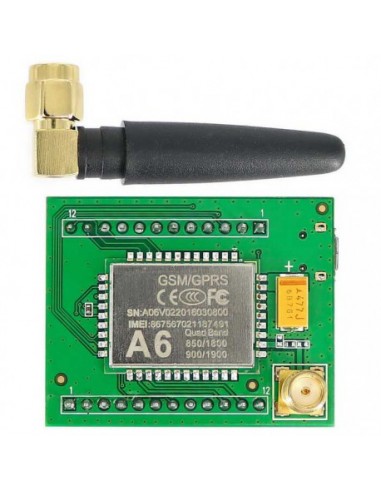- Out-of-Stock




This A6 GSM/GPRS Module is now a big competitor for SIM900 series module.
It supports dual-band GSM/GPRS network, available for GPRS and SMS message data remote transmission.
The board features compact size and low current consumption. With power saving technique, the current consumption is as low as 3mA in sleep mode.
It communicates with microcontroller via UART port, supports command including GSM 07.07, GSM 07.05 and Ai-Thinker enhanced AT Commands.
Features:
- Working frequency: quad-band network, 850 / 900 / 1800 / 1900MHz
- Working voltage: 4.5~5.5V DC (On-board voltage regulator circuit supply power for A6 module)
- Working current: maximum of 2A
- Sleep current: 5mA
- Onboard Micro SIM card holder, you can install Micro SIM card
- Onboard Micro USB interface for external power supply
- Communication Interface: TTL serial port
- Baud rate: 115200bps and it can also be set by AT command.
- Interface logic voltage: 3.3V
- Make and answer phone calls using a headset and electret microphone.
- Send and receive SMS messages.
- Send and receive GPRS data (TCP/IP, HTTP, etc.) .
- Default Baud rate: 115200bps and it can also be set by AT command.
- Pin pitch: 2.54mm, it can be soldered directly to the PCB experimental board
It has a few really nice features that you may not have considered usefull.
-- A real time clock that is set by the network it also knows its Time Zone.
-- 15 alarms yes 15 all with repeat function so you can set an alarm for 12 Noon and have it repeat Every day or every weekday etc. The alarm also powers the module on so for say a AMR system you could set the alarm for midnight each day the module would power up send +CALV: <n> to the controller the controller could then tell the module to send the data as a text and power the module down. Which can also be done by a single AT Command.
-- A low power mode <1mA. All functionally still works SMS phone e.t.c. but the AT command serial is off this is controlled by pulling a single pin low.

check_circle
check_circle